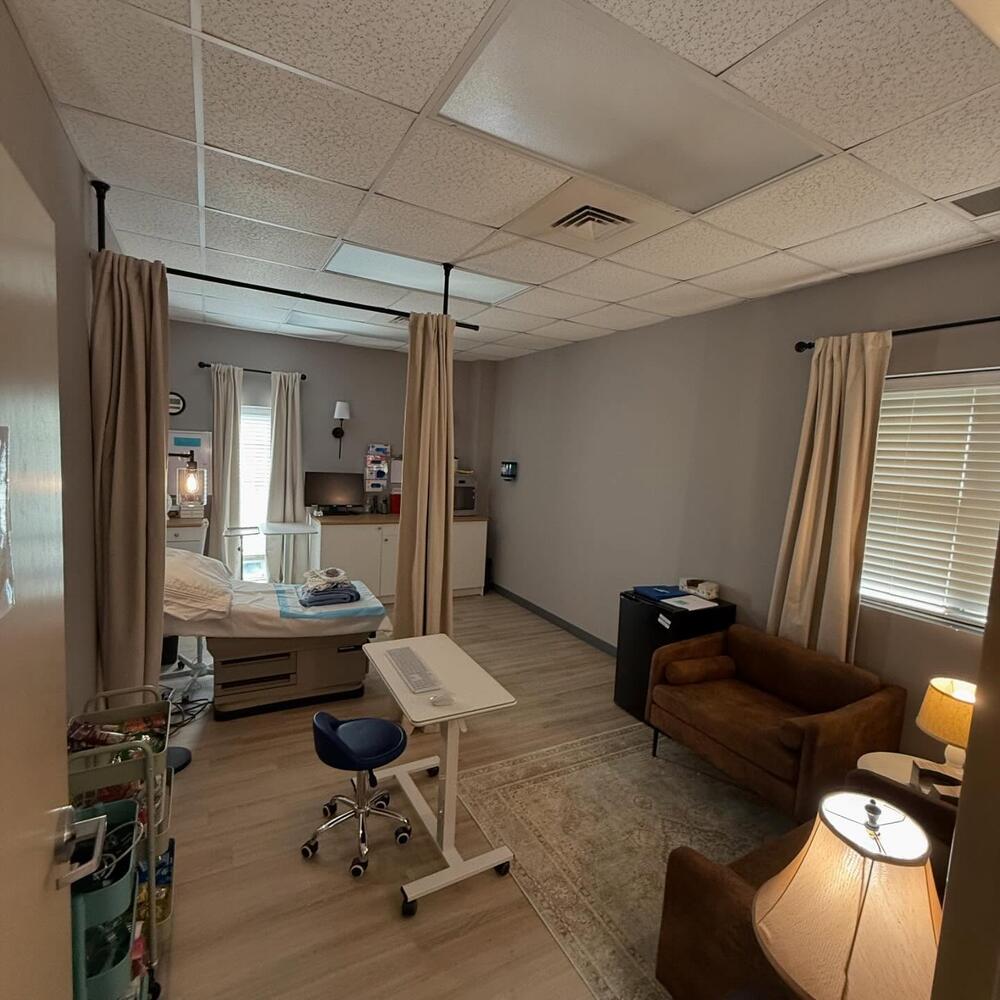
Caption
An exam room for survivors of violence and assault at the Bridging Hope center in Gainesville.
Credit: Janie Steckenrider/Bridging Hope
LISTEN: Seven centers in Gainesville, Vidalia, Marietta and others will receive funding through next year to help pay for exams in cases of non-fatal strangulation. GPB's Sofi Gratas explains.

An exam room for survivors of violence and assault at the Bridging Hope center in Gainesville.
When people are assaulted, it’s recommended that they get an exam. Trained staff at sexual assault and domestic violence shelters across the state do these exams at no cost and also connect survivors of abuse to resources.
As forensic nurse Janie Steckenrider puts it, these exams, for children and adults, are more than just a medical checkup.
“Providing the forensic portion of it, that can aid in an investigation and a prosecution,” she said. “And all of this is done in a really trauma-informed way.”
Steckenrider is part of what she called a “movement” to expand the kind of exams that are offered and to regularly, rather than sporadically, include care for survivors of non-fatal strangulation, she explained while at a recent conference for forensic medical examiners in Atlanta.
Her tagline? “Demand the Exam.”
“There's a huge association between someone putting their hands on your neck and then future lethality by that person,” she said. “So, we know that getting them out of those situations is paramount.”
But Georgia’s Forensic Medical Examination program only reimburses providers for exams on sexual assault victims. Steckenrider and longtime forensic nurse and sexual assault nurse examiner (SANE), Heather Williams, have until recently been doing these exams without compensation beyond the salaries they already receive to work Monday through Friday.
That means if survivors of this abuse come in after hours, they usually can’t get care.
“We've got the cameras; if we end up doing biological evidence collection, we've got the swabs, we have envelopes,” Williams said, listing those as "minor supplies. The biggest line item would be to pay the nurse for her time.”
And while assault victims and providers do have another option for reimbursement — filing a request through the state's Victim’s Compensation Program — state Rep. Karen Lupton said nurses have told her that can be complicated, and reimbursement can take a while.
So, organized by Lupton, Steckenrider and others, seven centers in Gainesville, Vidalia, Marietta and other locations will receive funding through next year to help pay for exams in cases of non-fatal strangulation, as part of a pilot program under the Criminal Justice Coordinating Council. Each center has been approved $60,000.
“This draws on helping survivors of sexual and domestic partner violence, as well as informing law enforcement and helping the justice system,” Lupton said. “It’s a big bang for the buck.”
Centers awarded funds to do non-fatal strangulation exams:
- Bridging Hope
- The Refuge
- LiveSafe Resources
- The Gordon County Child Advocacy Center
- The Haven
- FAITH's Power House
- The Sexual Assault Victim's Advocacy Center
Lupton, a survivor of sexual assault, said she hopes to raise awareness around the public safety concern that is strangulation and abuse.
The funding will bring better documentation of these cases, since the centers included will be required to report when they do these exams.
Evidence of strangulation can go unnoticed or untreated in an emergency room or by law enforcement, making exams at specialized centers an important step.
Already, Williams said, the non-fatal strangulation exams they’ve been able to do, and provide as evidence of abuse, have resulted in harsher charges against abusers.
“That is a huge accomplishment, to be able to help law enforcement in that way,” she said.
Select nurses at the center's awarded funds have already completed training and began exams on May 1.
At the Bridging Hope center, Steckenrider estimates that her team typically sees a couple hundred people come in who have been strangled each year. Williams has counted around 40 cases a year where she works: the Refuge, a sexual assault and domestic violence shelter that serves seven rural counties.
“We typically have more non-fatal strangulation patients in a given year than we do sexual assault patients,” Williams said.
National data suggests a third of woman and 1 in 6 men experience some form of sexual assault in their lifetime. According to the latest report from Georgia’s Commission on Family Violence, in 2023, there were around 37,600 incidences of family violence reported in the state and 163 fatalities from family violence.
In the 2024 legislative session, Lupton proposed a bill to change the definition of a forensic medical examination to include non-fatal strangulation.
But in a meeting of the House Judiciary Non-Civil Committee that year, Dannielle Lewis, a spokesperson for the Criminal Justice Coordinating Council, said the agency was “concerned ... about the possible fiscal impact.”
The CJCC did not respond in time for publication on how much a non-fatal strangulation exam costs on average.
Ultimately, the bill did not pass through. Instead, Lupton said she put representatives from the CJCC and sexual assault nurse examiners in the same room to work out what she referenced as “confusion” between the groups.
“I was like, 'OK, I think we all want the same thing,'” she said. “So then both sides of the table started talking to each other.”
By February of this year, the CJCC had closed the application deadline to the program, which according to the request for proposals will also include education and awareness activities, like trainings and presentations for local stakeholders, including law enforcement and health care providers. Final funding decisions were announced in April.